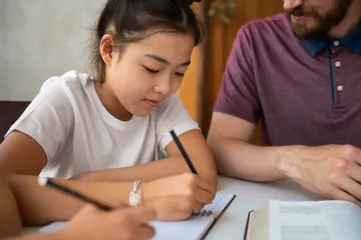Active Recall
Active recall is pulling information from memory without looking at notes, forcing the brain to strengthen neural pathways and making information stick better than rereading ever could.
Why passive review can be a problem
Most students waste hours rereading notes and highlighting text, creating false confidence without actual learning.
Problems with passive review:
• Reading feels productive but doesn't build memory
• Recognition mistaken for recall ability
• Hours of "studying" with minimal retention
• Confidence before tests that disappears during them
• Forgetting information days after learning it
• Needing to relearn everything before finals
Active recall feels harder because it is harder, but this difficulty is what makes it effective for long-term retention.
You're not alone
If your teen studies for hours but bombs tests, or forgets everything right after exams, they're using ineffective passive methods. Schools rarely teach evidence-based study techniques, leaving students to figure it out themselves. Most default to rereading because it feels easier, not realizing they're wasting time on methods that don't work.
What it looks like day to day
Student
Your teen reads the textbook three times, highlights everything in rainbow colors, then blanks on the test claiming they "knew it last night."
Parent
You see hours of "studying" that consists of staring at notes, then watch frustration when test scores don't reflect the time invested.
Tiny steps to try
Replace passive review with active recall techniques.
- 1
Close the book method
Read a section, close the book, write everything you remember. Then check what you missed.
- 2
Flashcard creation
Making cards is learning. Testing yourself with them repeatedly strengthens memory.
- 3
Teach back technique
Explain concepts aloud as if teaching someone else. Can't explain it? Don't know it.
- 4
Practice problems
For math and science, do problems without looking at examples. Struggle is good.
- 5
Brain dump
Before reviewing notes, write everything you remember about a topic. Then fill in gaps.
Why active recall matters
Active recall is the most powerful study technique validated by decades of cognitive science research.
Students using active recall need less total study time while achieving better grades and longer retention. The retrieval practice strengthens memory consolidation, making information accessible when needed. This technique works across all subjects and prepares students for the recall demands of tests and real-world application.
Ready to help your teen thrive?
Get personalized 1-on-1 coaching to build better habits and boost grades. Join 10,000+ families who trust Coachbit.
Frequently Asked Questions
My teen says active recall is too hard and takes too long. What should I say?
Acknowledge it feels harder because it actually engages the brain rather than creating an illusion of learning. Yes, it's initially slower, but it dramatically reduces total study time. Would they rather study easy for three hours or hard for one hour with better results?
Does active recall work for all subjects?
Absolutely. For facts and vocabulary, use flashcards. For concepts, explain them aloud. For math, solve problems without references. For essays, outline arguments from memory. Every subject benefits from retrieving rather than reviewing information.
Related Terms
Active Learning
Active learning is engaging with material through doing, discussing, and applying rather than passively reading or listening, leading to deeper understanding.
Metacognition
Metacognition is thinking about your thinking - understanding how you learn best, monitoring your comprehension, and adjusting strategies accordingly.
Spaced Repetition
Spaced repetition is reviewing information at increasing intervals to move it from short-term to long-term memory more efficiently than massed practice.
Study Skills
Study skills are the strategies and techniques that help students learn effectively, retain information, and perform well academically.
Test Preparation
Test preparation is the systematic approach to studying and reviewing material to perform well on exams, including strategies for different test formats.
Related Articles

Study Skills for High Schoolers – Mastering Note-Taking
Study strategies are vital to supporting high schoolers in their learning. Organized note-taking can provided a deeper understanding of subject material.
Read article
3 Tips to Help Your Child Focus on Homework
Kids struggle to focus and are easily distracted because their brains are undergoing rapid development. There are effective tools to improve concentration and focus in kids.
Read article
